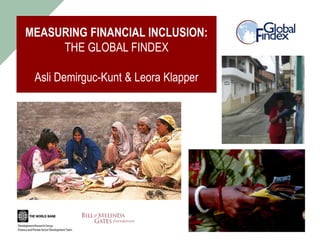
Klapper,l savings plenary_presenter1
- 1. MEASURING FINANCIAL INCLUSION: THE GLOBAL FINDEX Asli Demirguc-Kunt & Leora Klapper
- 2. GLOBAL FINDEX OVERVIEW Goal to collect comparable cross-country data on financial inclusion by surveying individuals around the world: ― Measure the use of formal and informal financial services, using consistent methodology across economies and time ― Identify the segments of the population with greatest barriers to access to finance: poor, woman, youth, and rural residents. ― Motivate and track policies to expand financial services to the poor ― Design a questionnaire to harmonize financial inclusion questions across economies Funded by a 10 year grant from the Bill & Melinda Gates Foundation (through 2020) Added questions on the use of financial services - payments, savings, credit, and insurance - to the 2011 Gallup World Poll
- 3. GLOBAL FINDEX ACCOUNTS AND PAYMENTS Over 2.5 billion adults do not have a formal account 41% of adults in developing economies are banked—compared to 89% of adults in high- income economies 37% of women in developing economies are banked—compared to 46% of men 23% of adults living below $2 per day have a formal account
- 4. GLOBAL FINDEX ACCOUNTS AND PAYMENTS 23% of adults in developing economies have a debit card—compared to 62% in high-income economies 11% of account holders in developing economies use their accounts for business purposes— compared to 29% in high-income economies
- 5. GLOBAL FINDEX ACCOUNTS AND PAYMENTS Women, youth, the poor, and rural residents are the least likely to have a formal account Adults in the poorest income quintile in developing economies are half as likely to be banked as adults in the richest quintile A 6-9 percentage points gender gap persists across income groups in developing economies
- 6. GLOBAL FINDEX ACCOUNTS AND PAYMENTS Percent of population with account 100% 80% 60% 40% 20% 0% 0 10,000 20,000 30,000 40,000 50,000 60,000 GDP per capita (constant 2000 USD) Source: Demirguc-Kunt and Klapper, 2012 and World Bank, 2012.
- 7. GLOBAL FINDEX ACCOUNTS AND PAYMENTS 31 percent of unbanked in Sub-Saharan Africa choose ―Too far away‖ 31 percent of unbanked in Europe and Central Asia choose ―[I] don’t trust banks‖ 40 percent of unbanked in Latin America and the Caribbean choose ―They are too expensive‖
- 8. GLOBAL FINDEX ACCOUNTS AND PAYMENTS 8% of account holders worldwide have zero deposits and withdrawals in a typical month 50% of account holders in developing economies both deposit into and withdraw from their account 1-2 times in a typical month
- 9. GLOBAL FINDEX SAVING 31% of adults in developing economies saved in the past year 56% of savers in developing economies saved using a formal financial institution 48% of savers in in Sub-Saharan Africa saved using a community-based method
- 10. GLOBAL FINDEX SAVING Formal and Informal Savings in Africa Adults saving any money in the past year (%) 60% 50% 40% 30% Saves using other methods only Saves at a Financial Institution 20% 10% 0% Central Africa West Africa East Africa Southern North Africa Africa World Africa Source: Demirguc-Kunt and Klapper (2012) 48% of savers in Sub-Saharan Africa save using a community savings club 53% of women who save in Sub-Saharan Africa do so using an informal savings club, compared to 43% of men who save.
- 11. GLOBAL FINDEX SAVING 7% of account holders in ECA saved formally in the past year 40% of account holders in developing economies saved formally in the past year 39% of account holders in SSA and 15% of account holders in LAC saved informally in the past year
- 12. GLOBAL FINDEX SAVING Reasons for Saving Adults saving any money in the past year (%) Emergencies or a time when you expect to have less income SSA SAR MENA LAC ECA Expenses in the future such as EAP education or a wedding, 0 10 20 30 Source: Demirguc-Kunt and Klapper (2012) 80% of unbanked savers in SAR saved in the past year for emergencies Over half of unbanked savers in developing economies saved for future expenses 23% of unbanked adults in SSA saved in the past year for emergencies
- 13. GLOBAL FINDEX CREDIT AND RISK MANAGEMENT To conclude: • This data can be useful for policy makers, bankers, NGO’s, donors, and researchers interested in a holistic understanding of how adults around the world use financial services. • The data is included in the G-20 GPFI basic set of financial inclusion indicators to benchmark and set targets for financial inclusion strategies. • Key headline indicators –formal accounts and credit—will be available annually, and the full questionnaire will be collected triennially. Microdata will be released Nov 27. • Low rates of savings in many developing countries should encourage new modes of access and product development.
- 14. GLOBAL FINDEX DATA RELEASE Global Findex Suite of Products ― Financial Inclusion Data Portal ― World Bank eAtlas of Financial Inclusion ― The Little Data Book on Financial Inclusion 2012 ― Global Financial Inclusion Microdata Databank (November 2012) www.worldbank.org/globalfindex